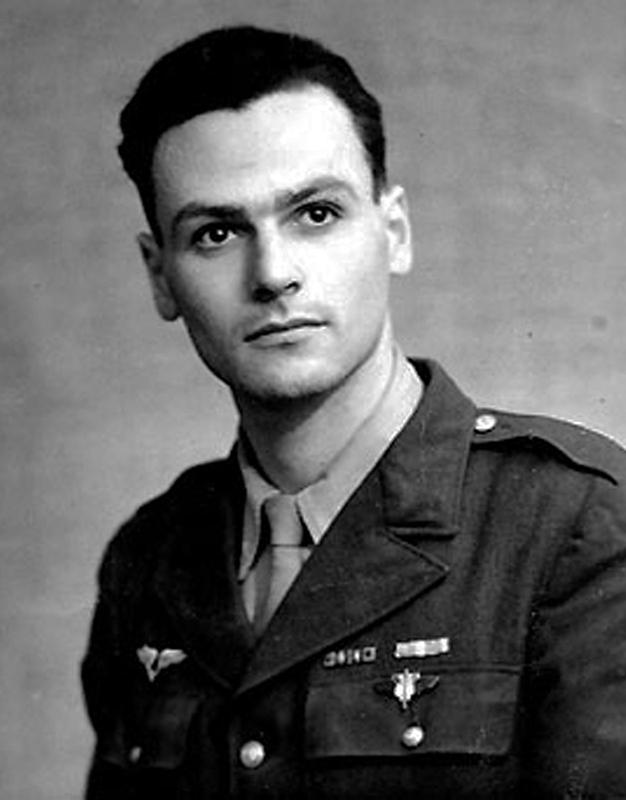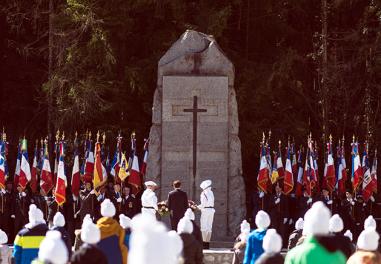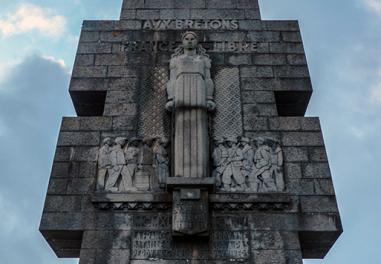Pierre Simonet
Enlisted in June 1940 in the Free French Forces, Pierre Simonet took part in many campaigns, including Syria, Libya, Tunisia and Italy, before landing in Provence in August 1944. He is today one of only three surviving Companions of Liberation.

This year is the 75th anniversary of the liberation of France. Where were you in 1944?
I was involved in the operations for the liberation of France throughout the year, right up to 8 May 1945, the date of the German surrender. From March 1944, I was engaged in the Italian Campaign. On 16 August, I landed in Provence with the 1st Free French Division as an air observer on a Piper Cub. I carried out 137 missions in 250 flight hours, and obtained four citations.
Why is it important to go on commemorating these events 75 years on?
Let us not forget that in June 1940, the French Army had been demolished by the German Army. The French State signed the armistice on 22 June 1940, and gave up half of its territory to German occupation. Rejecting this humiliation, General de Gaulle affirmed in his call to arms of 18 June 1940: “France has lost a battle, but she hasn’t lost the war. That war is a world war. We may be overcome today by mechanical strength, but we could triumph in the future through superior mechanical strength. The fate of the world is at stake.” And so it came to pass.
On 8 May 1945, the face of world changed. Germany surrendered to the Allied forces. France was very much present in the fighting that led to victory. It participated fully in liberation.
The French 1st Army, which landed in Provence, liberated Toulon and Marseille and pursued the German Army as far as Alsace. And it was General Leclerc’s 2nd Armoured Division that liberated Paris and Strasbourg.
The Resistance was a great support in this epic reconquest. And to crown France’s involvement, on 8 May 1945, in Berlin, General de Lattre de Tassigny, commander of the French 1st Army, signed the final instrument of the German surrender, alongside the American, British and Russian generals.
To commemorate is to seize a wonderful opportunity to remind the younger generations that, by rejecting the attitudes of resignation, feebleness and submission, the powerful forces of the nation saved France from the barbarity that threatened the world.
How do you view today’s world in the light of your engagement for France?
In 75 years, our world has changed considerably.
1945 saw the end of three Franco-German wars: 1870-71, 1914-18 and 1939-45. Since then, Europe has been built around a reconciled France and Germany; the Cold War ended with the fall of the Berlin Wall in 1989; the colonial empires gave way to independent countries in Africa and Asia; founded in 1945, the United Nations has grown from 51 to 193 members; we are seeing the mass migration to Europe of people from the Middle East and Africa, fleeing war and poverty; a second economic revolution is under way, with the dizzying development of computers and the internet; global overconsumption and overpopulation are contributing to the problem of climate heating (and our young people are rising up to raise awareness!). Finally, a new international crisis is emerging, with increasing numbers of terrorist attacks across all continents.
As a Companion of Liberation, I am not in a position to judge what is an increasingly complex global situation, but I can nevertheless express a hope, doubtless the same one I clung to as a young man, 75 years ago: that of safeguarding this value of liberty which we fought so hard for.
Articles of the review
-
The file

Liberating France
The Allies that landed in occupied France on 6 June and 15 August 1944 undeniably contributed to the country’s liberation, the uprising of the people and the mobilisation of the Resistance. But they did not act alone. The French armed forces were also involved, from the Normandy beaches to the liber...Read more -
The event

Il y a 75 ans, la Libération
Read more -
The figure

The Free France Foundation
For the 75th anniversary of liberation, the Free France Foundation brings its network and dynamism into play to organise a rich programme of events to honour and celebrate the Free French who distinguished themselves in 1944 and 1945.
Read more

